This article was medically reviewed by Luba Lee, FNP-BC, MS. Luba Lee, FNP-BC is a Board-Certified Family Nurse Practitioner (FNP) and educator in Tennessee with over a decade of clinical experience. Luba has certifications in Pediatric Advanced Life Support (PALS), Emergency Medicine, Advanced Cardiac Life Support (ACLS), Team Building, and Critical Care Nursing. She received her Master of Science in Nursing (MSN) from the University of Tennessee in 2006.
There are 7 references cited in this article, which can be found at the bottom of the page.
wikiHow marks an article as reader-approved once it receives enough positive feedback. In this case, several readers have written to tell us that this article was helpful to them, earning it our reader-approved status.
This article has been viewed 822,606 times.
Whether it's a symptom of a passing illness or a chronic issue, a persistent cough can be uncomfortable and frustrating. Soothe your throat with cough drops, mints, and lozenges. Drink plenty of water. Sip warm tea with honey. If you can't cope with your coughing, try using over-the-counter medication: decongestants, expectorants, and cough suppressants. Only take the recommended dose. Ultimately, know that you may just need to soothe your throat and wait out the coughing fit. Visit a doctor if your coughing persists for longer than a month—it may have become a chronic cough.
Steps
Treating the Annoying, Short-Term Cough
-
1Stay hydrated. The stuff that comes out of your nose and trickles down your throat when you're sick or dealing with allergies (lovingly called the post-nasal drip) can irritate your throat and contribute to coughing fits. Fortunately, a lot of that irritation can be relieved by drinking warm water. This thins out the mucus, making it more manageable for your throat.[1]
- Water, as always, is best. Stay away from coffee and carbonated drinks--they may irritate your throat even more.
-
2Keep your throat healthy. Though taking care of your throat doesn't necessarily mean taking care of your cough (that's often a symptom in itself), it will help you feel and sleep better.
- Try lozenges or cough drops. They soothe or numb the back of the throat, decreasing the cough reflex.[2]
- Drinking warm tea with honey helps soothe the throat in a similar manner. Make sure it's not too hot though!
- 1/2 tsp (2.5 ml) of ground ginger or apple cider vinegar with 1/2 tsp (2.5 ml) of honey is not an common tactic, but it is medically supported.
Advertisement -
3Breathe some humid air. Humidity can help moisturize your nasal passages, reduce post-nasal drip, and soothe your throat, which may reduce your coughing.[3] You can increase your humidity by:
- Taking steamy showers. They can loosen the secretions in your nose, making it easier to breathe.
- Investing in a humidifier. Putting moisture back in the air if it's dry can help ease the pain.
-
4Remove irritants from your environment. Being around things that irritate your nose, lungs and throat can cause or aggravate coughing. Perfumes and scented deodorizing sprays are harmless on the outside, but some people are sensitive to them and can develop sinus irritation from the exposure.
- Of course, smoke is the ultimate culprit. If you are around someone who smokes, remove yourself. If you smoke, your cough is probably chronic and above being deemed just a nuisance.
-
5Try over-the-counter decongestants. These medications work their miracles by lessening the amount of mucus your sinuses produce and shrinking your swollen nasal tissues. They can also dry up the mucus already present in your lungs and open up the airway passages. You can find them in pills, liquids and sprays.
- As with any medication, look at the potential side effects before taking a decongestant. Some, like pseudoephedrine, can raise your blood pressure, so don't take it if you struggle with hypertension unless your doctor recommends it.[4]
- Do not give decongestants or other over-the-counter cough medications to children under the age of 4 without consulting a pediatrician.
-
6Use cough suppressants for severe coughs. These medications work by minimizing your brain's cough reflex.[5] If you can barely get a wink of shut eye because your chest hurts so bad, you may want to go for cough suppressants like Delsym, DexAlone, and Vicks Formula 44. Always follow the directions on the package.
-
7Look into expectorants for phlegmy coughs. If your cough is thick with phlegm, it helps to take a cough expectorant such as guaifenesin--found in Humibid, Mucinex, Robitussin Chest Congestion, and Tussin. These thin out the mucus, and the pretty part is you'll be able to cough it up.[6]
-
8Relieve your cough with saline nasal spray. Moisturize your nasal passages with 2 to 3 drops of nasal saline every 3 to 4 hours. This can also soothe your throat and minimize post-nasal drip, which can cause coughing.
-
9Talk to your doctor. A simple cough may not warrant a visit to a healthcare professional, but if it lingers or is the side effect of a bigger problem, it's best to consult someone who can properly diagnose you.[7]
- Regardless of the duration of your cough, if you are coughing up blood or experiencing chills or fatigue, see your doctor immediately. They will be able to determine the cause of your cough--asthma, allergies, the flu, etc.
Managing the Severe, Lingering Cough
-
1See a doctor. If your cough has lasted longer than a month, your subacute cough may be turning into a chronic cough. Visit your doctor for a cough lasting more than a few weeks.[8]
- You may have a sinus infection, asthma, or gastroesophageal reflex disease (GERD). Knowing the cause of your cough is the first step to treating it.
- Your doctor may put you on an antibiotic if you have a sinus infection. They may also suggest a nasal spray.
- If you have allergies, you'll obviously be told to avoid those allergens as much as possible. Your cough could diminish easily if this is the case.
- If you have asthma, avoid conditions that make it flare up. Take your asthma medications regularly and avoid all irritants and allergens.
- When acid from your stomach gets into your throat, that's GERD. There are medications your doctor can prescribe for you to relieve your pain. Apart from that, wait 3 or 4 hours after you eat before you go to bed and sleep with your head adequately elevated to lessen your symptoms.
-
2Quit smoking. There are many programs and resources out there to help you kick the habit, and your doctor can help. They can refer you to a program or expose you to new, effective methods.
- If you are around second-hand smoke, know that that could be an explanation for your cough. Remove yourself as often as possible.
-
3Take medication as recommended by your doctor. Coughs are generally a symptom -- therefore, cough medications are only taken when the actual problem isn't known. If you have a chronic cough, though, that's a slightly different story. Only take medications if your doctor okays it. Here are your options:
- Antitussives are prescription cough suppressants. These are generally the last thing to be recommended and only are so when nothing else works. OTC cough suppressants aren't backed up by science, for the record.
- Expectorants loosen up mucus, and as a result, you cough it up.
- Bronchodilators are medicines that relax your airways.
-
4Up your fluid intake. Though the cause of your cough won't go away, you'll feel significantly better.
- Drink mainly water. Carbonated or overly sugary drinks can irritate your throat.
- Warm soups or broth can help ease the pain of an aching throat, too.
Relieving Coughs in Children
-
1Avoid certain medications. The FDA states that most OTC medications can cause side effects in children under the age of 4. Keep this in mind when treating your child's cough, and consult a pediatrician before giving your child any medicine.
- Cough drops should not be used for children under the age of 2. They are dangerous and considered a choking hazard at this age.
-
2Practice healthy throat habits. Making things easier on the throat lessens the side effects of your child's cold or flu. Take steps to minimize their symptoms.
- Offer plenty of fluids. Water, teas, and juices are fine (breast milk for babies as well). Stay away from sodas and citrus drinks that may irritate the throat.[9]
- Have them sit in a steamy bathroom for around 20 minutes and put a humidifier in their bedrooms. These methods may clear the nasal passageways, reduce coughing, and make for easier sleep.
- Have them gargle with a little warm salt water to reduce throat irritation.
- Use some child-safe nasal saline drops to reduce post-nasal drip, which can trigger coughing.
-
3See a doctor. If your child is finding it difficult to breathe or the cough has lasted longer than 3 weeks, seek a medical professional immediately.
- If the child is under 3 months old or the cough is accompanied by fever or other symptoms, this is especially important.
- Take note if the cough happens at roughly the same time every year or is caused by something specific--it may be allergies.
Using the Honey and Cream Remedy
-
1Grab a saucepan, honey, cream, and butter. Some studies show that honey is an effective remedy for coughs and throat irritation.[10] A combination of honey and warm milk or cream can be a wonderfully soothing combination when you can't stop coughing.
- For this recipe, you'll need 1 cup (200 ml) of full cream milk, 1 tablespoon (15 ml) of honey, and 1 teaspoon (5 ml) of butter or margarine.
- Never give honey to a baby under the age of 1 year, since this can cause a serious bacterial infection.[11]
-
2Heat the cream, butter and honey. Start by heating the cream on your stove in a saucepan. Add the honey and butter, and stir once initially.
- Boil ingredients slowly until the butter melts. This forms a yellow layer on the top. The yellow layer is fine--don't feel the need to stir it up again.
-
3Pour the mixture into a cup and enjoy. This drink coats the throat, numbing it. Your cough should stop or lessen significantly within an hour of drinking this mixture. Note that the cold or flu (the cause of the cough) will not go away.
- Allow the mixture to cool slightly before giving it to children.
- Sip slowly! Make sure you drink the yellow part, too.
- Make sure you keep yourself warm. A cold body is more prone to illness.
- And if you have dry coughs, drink lots of water!
References
- ↑ https://www.entnet.org//content/post-nasal-drip
- ↑ https://www.westsuffolkccg.nhs.uk/wp-content/uploads/2013/07/cough-in-adults-lores-_v3pages.pdf
- ↑ https://www.mayoclinic.org/symptoms/cough/basics/when-to-see-doctor/sym-20050846
- ↑ https://www.health.harvard.edu/newsletter_article/no-coughing-matter
- ↑ https://www.health.harvard.edu/newsletter_article/no-coughing-matter
- ↑ https://www.health.harvard.edu/newsletter_article/no-coughing-matter
- ↑ https://www.mayoclinic.org/symptoms/cough/basics/when-to-see-doctor/sym-20050846
- ↑ https://www.mayoclinic.org/symptoms/cough/basics/when-to-see-doctor/sym-20050846
- ↑ http://kidshealth.org/parent/firstaid_safe/sheets/cough_sheet.html
Expert Q&A
-
QuestionI am having asthma and there is much congestion. What should I do?
 Luba Lee, FNP-BC, MSLuba Lee, FNP-BC is a Board-Certified Family Nurse Practitioner (FNP) and educator in Tennessee with over a decade of clinical experience. Luba has certifications in Pediatric Advanced Life Support (PALS), Emergency Medicine, Advanced Cardiac Life Support (ACLS), Team Building, and Critical Care Nursing. She received her Master of Science in Nursing (MSN) from the University of Tennessee in 2006.
Luba Lee, FNP-BC, MSLuba Lee, FNP-BC is a Board-Certified Family Nurse Practitioner (FNP) and educator in Tennessee with over a decade of clinical experience. Luba has certifications in Pediatric Advanced Life Support (PALS), Emergency Medicine, Advanced Cardiac Life Support (ACLS), Team Building, and Critical Care Nursing. She received her Master of Science in Nursing (MSN) from the University of Tennessee in 2006.
Board-Certified Family Nurse Practitioner If you have asthma and your cough has worsened it is always a good idea to check with your doctor. In the meantime, drink plenty of warm liquids, including clear broths to support your immune system and loosen the mucous, take vitamin C, practice breathing exercises, avoid environmental irritants, self-percuss your chest, and avoid dairy and large heavy meals.
If you have asthma and your cough has worsened it is always a good idea to check with your doctor. In the meantime, drink plenty of warm liquids, including clear broths to support your immune system and loosen the mucous, take vitamin C, practice breathing exercises, avoid environmental irritants, self-percuss your chest, and avoid dairy and large heavy meals.
Warnings
- A cough can be a symptom of something much bigger or more dangerous to your health. If you are experiencing other life-altering side effects, seek professional care immediately.⧼thumbs_response⧽
About This Article
To stop a short-term cough, also known as postnasal drip, drink plenty of water to thin out the mucus. You can also try cough drops as they numb the throat and decrease the cough reflex. For a cough that lasts longer than a month, see a doctor to determine if you have a sinus infection, asthma, or allergies. For children with a cough, try sitting in a steamy bathroom for 20 minutes and use a humidifier in their bedroom to clear nasal passages. To learn more from our Medical Review Board co-author, like how to make a home remedy for your cough with honey and cream, keep reading!

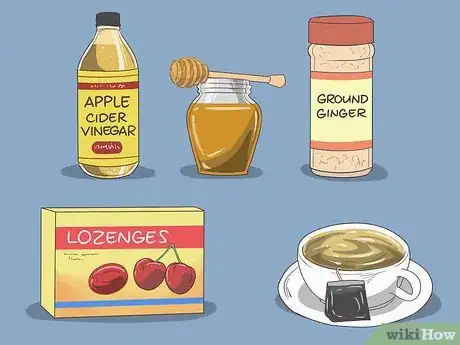
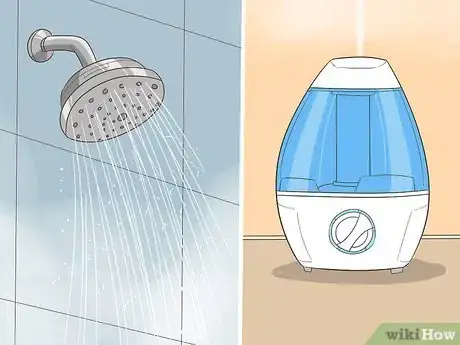
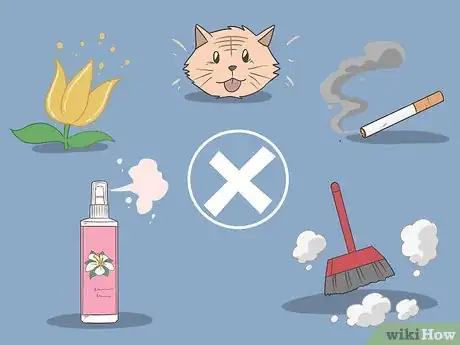
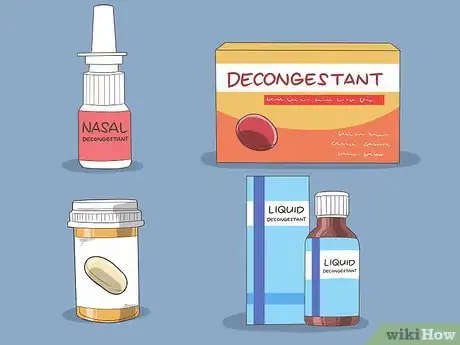
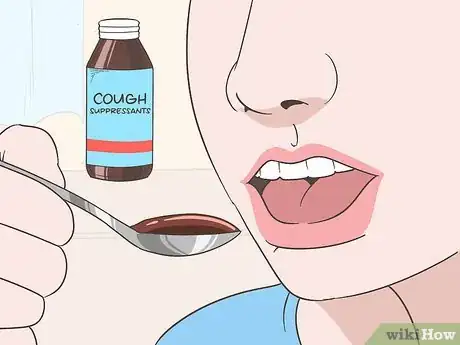
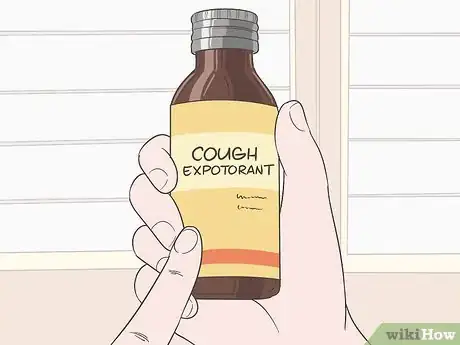
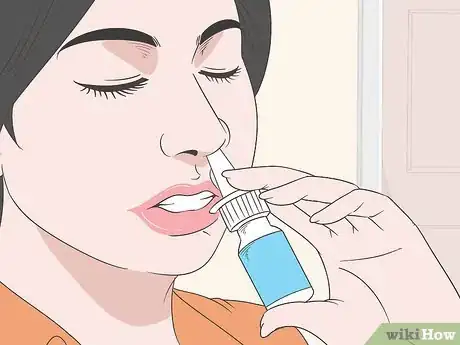
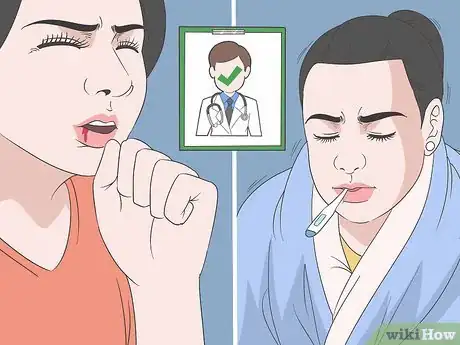

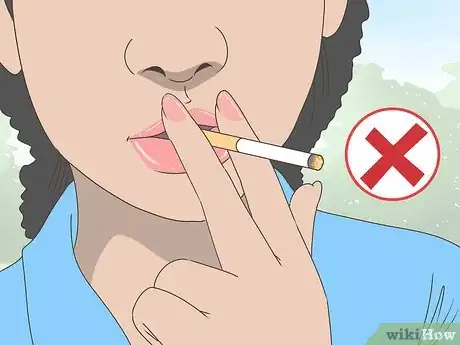
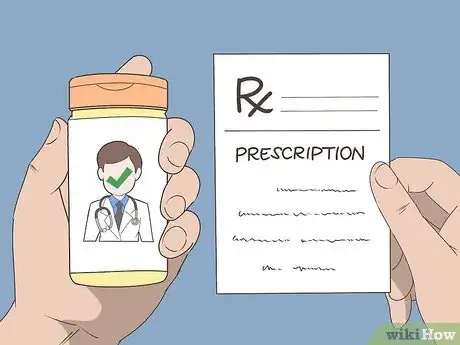
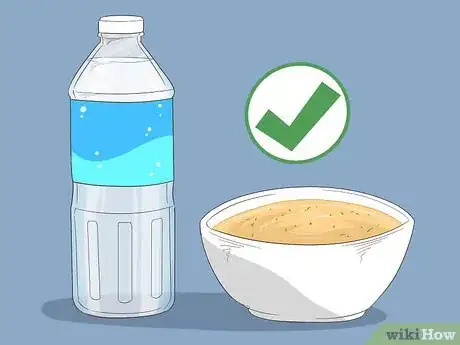
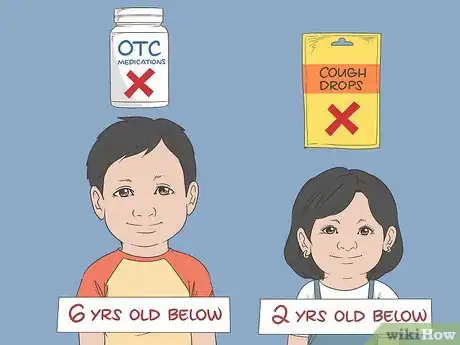
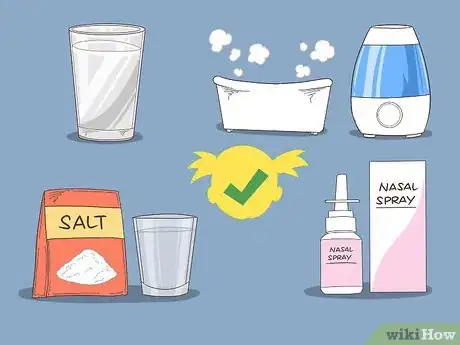

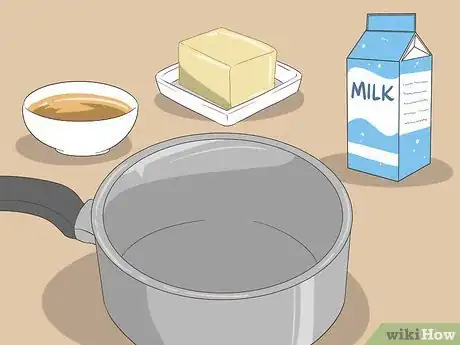
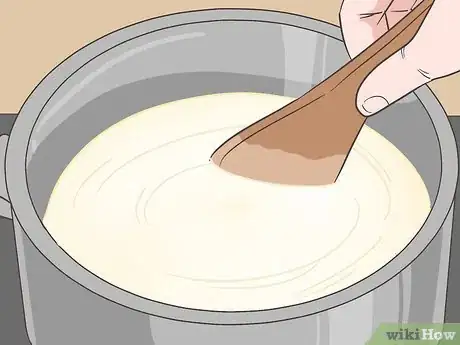

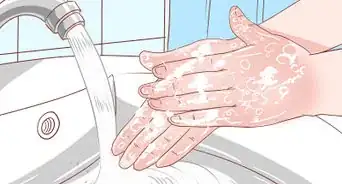

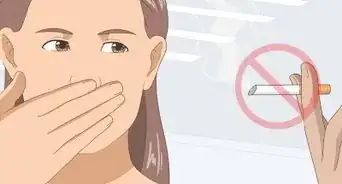

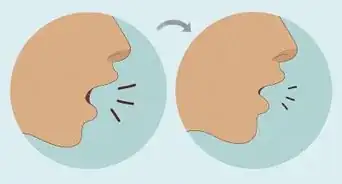



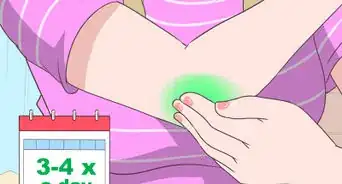


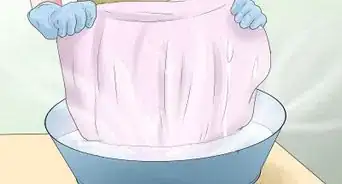
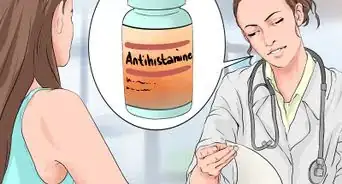
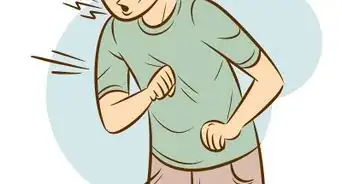










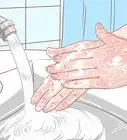

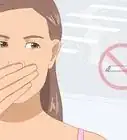
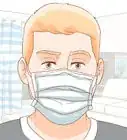



































Medical Disclaimer
The content of this article is not intended to be a substitute for professional medical advice, examination, diagnosis, or treatment. You should always contact your doctor or other qualified healthcare professional before starting, changing, or stopping any kind of health treatment.
Read More...